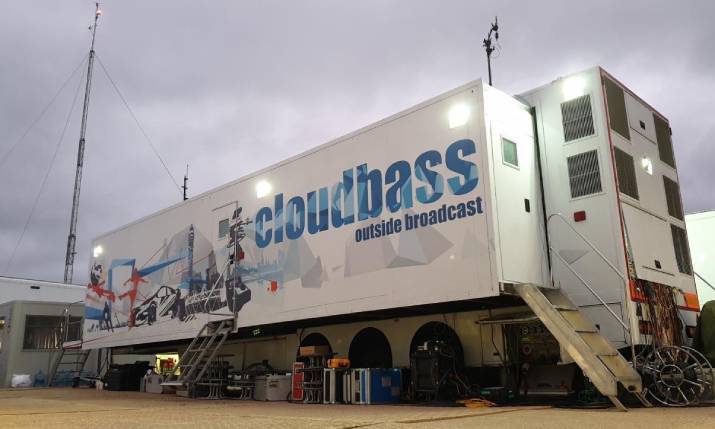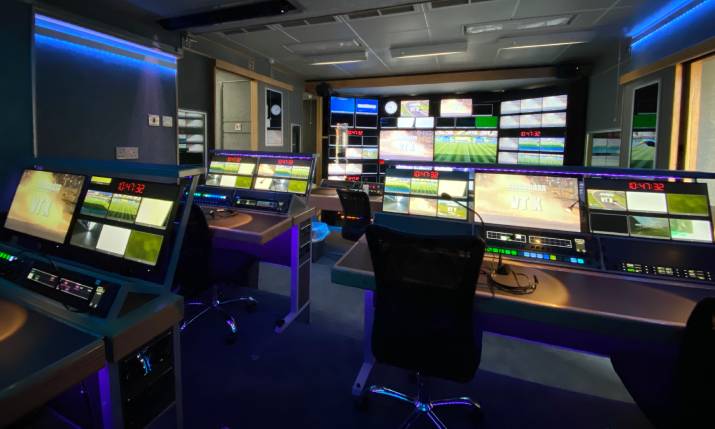Tech insight: Cloudbass duo James Lacey and Michael Beaumont talk recruitment, remote-control production and an IP-based future
 James Lacey and Michael Beaumont, directors at OB company Cloudbass, began working in together over 20 years ago at university, and have just never stopped.
James Lacey and Michael Beaumont, directors at OB company Cloudbass, began working in together over 20 years ago at university, and have just never stopped.
Beaumont only half-jokingly refers to the founding of the company as, “another accident really”. He goes on: “Cloudbass formed from some people at university who enjoyed doing fun stuff together, and that just progressed,” he explains. “James and I were in the same year at the University of Derby. That’s where we met Steve Knee [managing director, Cloudbass].
“Our first year, we were sort of just messing about doing shows. Second year, it started to get a little bit more serious, not so much on the work/studying side, but more of doing a bit of freelance work on the side. And then Cloudbass got set up between our second and third year of university. By the time we’d left, James and I went full time into the company.”
“Remote production was essential under COVID. We couldn’t have done things without it. But I think you lose an element of live, and that feeds back into recruitment; if we want the best and the brightest, do they really want to be sat in sat in a dark room in West London when they could be at Old Trafford? “
The company does not have a CTO per se. “My official title is technical director,” says Beaumont. “It’s a bit fluid because we’re owner-run. There are five shareholders who are the five directors of the business. We are hands-on as a company. There’s no big corporate entity pulling the strings.
“We all started as engineers and that is what we still do. I still am regularly on the road doing jobs. Because that’s what we grew up doing. And that’s what we love. It’s sort of almost an accident that we ended up with a company,” Beaumont continues.
“We’re obviously doing something right,” adds Lacey.
Lacey emphasises Cloudbass’ long-standing customers as an example of how they’re doing something right. “Question Time is one of those. We wouldn’t be doing it 10 years on if we couldn’t deliver it week in, week out. We’ve done Scottish Premier League for Sky since 2014. We’ve got Pay Per View boxing coming in. That’s Sky’s crown jewel in terms of sports because the revenue. We’re trusted, and that’s good, that’s reassuring.
“We also do a bit of subbing, for other OB companies,” says Lacey. “Not a huge amount, but we do get involved in peak events. We did some Rugby League World Cup for EMG. We did the Cenotaph for EMG this year. We do Premier League for EMG on Amazon Prime for the December matches and Boxing Day matches. I think we fit into a lot of different moulds.”

Inside one of the Cloudbass OB trucks
People challenges
Beaumont and Lacey are in perfect agreement when asked what the biggest challenge Cloudbass faces on a regular basis. “People,” says Beaumont. “People is the easiest answer to that question.”
Lacey continues: “Literally getting enough people into the industry with suitable skills. I don’t think anyone’s going to come in fully formed, but they need to come with the ability to learn well, to pick up the skills, and to be open enough when they arrive. It takes a certain type of person; the right kind of people who want late nights and who want to work weekends. We’ve recruited several out of theatre recently. They’ve got good transferable skills, and potentially OBs are a slightly nicer environment than some theatre environments.”
Lacey speaks of the impact of being based outside of London in terms of recruiting. “We have an additional challenge, which shouldn’t be a challenge; the fact that we are regionally based. We are 10 minutes from the M1, but we’re in the Midlands. It’s scary how much how much of a drain there’s been since Carlton studios in Nottingham closed in 2005.
“I think we have great opportunities,” he goes on. “We’ve had people relocating to come to the nicer lifestyle away from the southeast. It’s great; go work for an OB company and travel the world; come work for Cloudbass and live in the East Midlands. But we also have people who live in Newcastle, and people who live in Glasgow, and we have someone who lives in Crieff. We have people in London. We have we have people all over the place. We’re not frightened of being widespread.”
Since the Covid-19 lockdowns, working remotely has got significant attention in the OB world. Cloudbass is taking an analytical approach to remote production. “You have to know the raison d’etre,” says Lacey. “Is it to take people off site? Is it to make it more carbon efficient? Every time you investigate it, it doesn’t make a huge amount of sense, with the amount of carbon involved in getting all those signals around, and the quality that drops because you’re compressing everything at source.
“Remote production was essential under COVID. We couldn’t have done things without it. But I think you lose an element of live, and that feeds back into recruitment; if we want the best and the brightest, do they really want to be sat in sat in a dark room in West London when they could be at Old Trafford? Do they want to go to site? Does the director want to walk around the stadium and say, “I want to move that camera two inches to the left?””
Lacey believes that distributed production, where equipment stays on site and people operate it remotely will become a very important way of working
“We keep the signals all in one place and give the operators the ability to take control from wherever they are with very low latency monitoring feeds,” he says. “We don’t send all the sound sources from a site to someone’s house and bring them all back again. But we do allow for the remote control of VTs and of graphics. It’s remote-control production rather than remote production.”
IP futureproofing
Lacey identifies fibre optics as the technology that has made the most significant difference to OBs over the past 10 years. “We refurbed a truck with Riedel’s MediorNet as its router back in 2020,” he says. “We have a distributed router where we can essentially put router cards out in the field. It’s fantastic; it’s everything IP should be, in an OB world. And that coupled with general IP is more and more what we do.
“We have a team of people who install fibre. When we put in temporary rigs for every motorsport event we do, they go in, they get turned on site. It’s just so much better than using pre-ended cable; it’s such a higher standard. Things last longer, they work better, they work quicker. It may cost us slightly more with a cost that we can’t necessarily pass on, but it just gives a better experience to our clients. And I think that’s a huge thing,” Lacey concludes.

